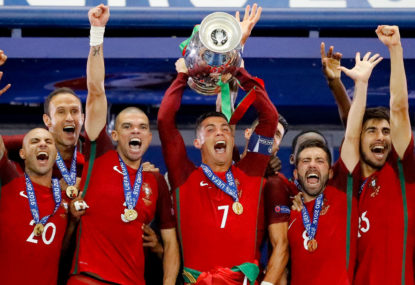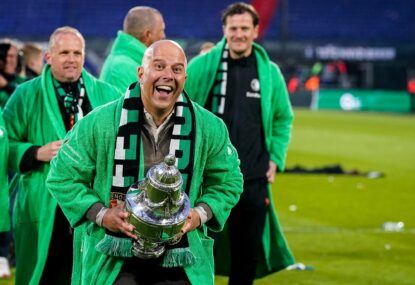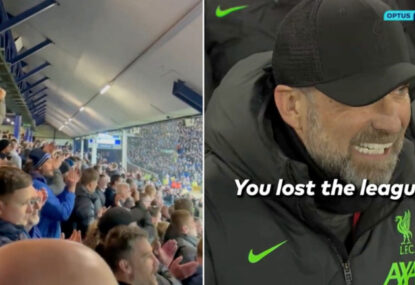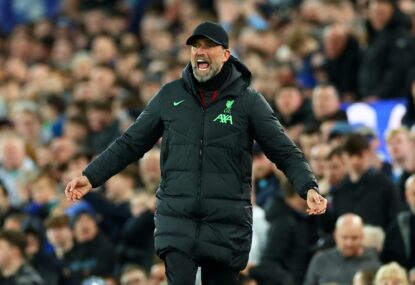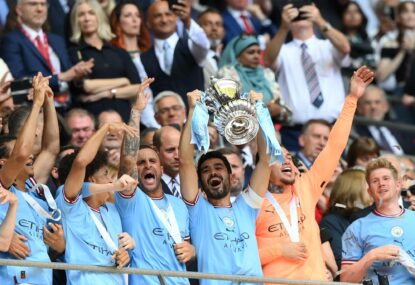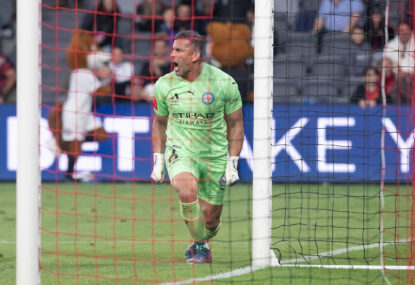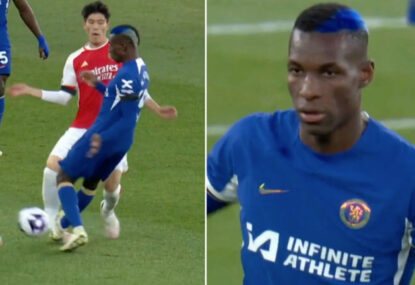Portugal are the 2016 European champions. This is the worst team Portugal has had in 20 years.
Two facts that apparently are not mutually exclusive. The small nation of ten million people has created a place for itself in international football in the 21st century, delivering in Cristiano Ronaldo, Jose Mourinho and Jorge Mendes most important European player, coach and agent in world football, as Simon Kuper put it.
What they hadn’t delivered before was an international title until July 2016. There has been a gamut of commentary on Portugal’s ‘uh-oh’ progression through the tournament and the eventual title win of undoubtedly the most ordinary international champions of our times. Greece were at least committed, clever and miraculous.
Kuper said that Portugal deserved to hang their hat on Euro 2016 if only to salute their football culture and the superior but doomed Portugal teams of the past. Miguel Delaney similarly wondered if a title in 2016 would avenge their glorious team from 2000.
It was curious and perhaps stupid that he thought a random defeat to France was worse than the home loss to Greece in the Euro 2004 final, but opinions make the world interesting. It’s true that the 2000 team was highly rated. They were called the Golden Generation: Luis Figo, Rui Costa, João Pinto, Fernando Couto, Vitor Baia et al.
Euro 2000, the birth of tiki-taka
At Euro 2000 they played the ball around classically until defender Abel Xavier blocked Sylvain Wiltord’s shot with his hand in the 117th minute of the semi-final against France. When the fourth official called for a penalty Portugal sniffed conspiracy and spent five minutes arguing against the penalty before Zinedine Zidane put it in.
A tournament in which Portugal had delighted in arguably being the first to introduce tika-taka to the world a decade before Spain, ended in disgrace.
The end of the so-called Golden Generation came in a tame group stage elimination at World Cup 2002, only notable for another emotional meltdown in which João Pinto allegedly punched the referee. The fact that they hadn’t even qualified for World Cup 1998 probably best illustrated Portugal’s flakiness of those times.
The desolation of 2004
The true Portuguese Golden Generation was the one that came after that in 2004. In the year that the young FC Porto won the Champions League introducing Deco, Maniche, Ricardo Carvalho and above all coach Jose Mourinho to the world, Cristiano Ronaldo was also playing his first breakout season with Manchester United.
The up and comers were supplemented by legends Rui Costa and Luis Figo and formed a tight Portuguese unit that used both skill and blood, sweat and tears to reach the final of Euro 2004, played at home in Portugal.
The desire could be summed up by the wafer-thin, exciting wins against Spain and England, displaying a toughness not seen in previous Portugal teams.
The skill, meanwhile, was encapsulated in two otherworldly moves. In a penalty shootout against England, inexperienced forward Helder Postiga faced elimination for the entire country if he missed his penalty. He scored with a showy, low-percentage chip down the middle.
Maniche then won the semi-final against Holland with a shot that curled at least 20 degrees.
Victory in Lisbon against the massively inexperienced Greece should have been a given. But Greece completely outhustled them in the final and the world reacted with scorn. It was a devastating blow to the entire nation, who guessed that their one and only chance to win a tournament had passed them by. In the tradition of saudades and faro music, it was a sadness that some cruelly said corresponded with the national consciousness.
Ronaldo emerges then falters
Watching highlights of the 2004-6 team, it is striking how much Cristiano Ronaldo ran with the ball, how dynamic he was in these tournaments. Perhaps just being one among equals inspired him to put in the hard yards. During the England penalty shootout of 2004, his 19-year-old version is seen linked with Nuno Gomes and Nuno Valente, just one of the team.
The rot set in for Cristiano Ronaldo and Portugal in 2008. Figo, Rui Costa, Maniche and soon Deco were all gone, and he was now undisputedly top dog. He stopped being a winger and simply wanted to score Portugal’s goals. He began to stand apart from the team during their penalty shootouts.
Even as he became the world’s showiest and equally most effective player, his Portugal output inversely dwindled. He has only ever scored three ineffectual World Cup goals in three tournaments. Portugal also (subsequently) declined post-2006.
Tiki-taka usurped
Portugal have always played the ball around brilliantly in midfield, using short passes to weave webs. They have never, however, had an effective forward to cap this faux-domination with goals. This was probably why they lost Euro 2004 – it was easier for Greece to blunt, say, Deco, than it would be to annul Andrii Shevchenko, for example.
I had hoped that Portugal could revolutionise the game in this way, but Spain were the ones who ended up doing that, while Portugal declined around their selfish captain.
Limping into 2016
All Portugal’s usual problems could be seen in their three group draws at Euro 2016. Ronaldo was simply shooting for goal from all angles – badly – instead of looking to involve teammates. He also missed a vital penalty. The rest of the team were uninspired.
Portugal turned their back on their history this time. If they had no good forwards – as always – but two serviceable wingers in Ronaldo and Nani in the tradition of Fernando Chalana and Luis Figo, they decided they may as well use them as forwards. The rest of the team would have to just sweat it out without any transcendent ability on the wings.
The world began hating on Portugal for not winning games but luckily progressing, for the terrible spectacles of their matches against Croatia and Poland, for Ronaldo’s arrogance towards Iceland and Pepe’s grim gamesmanship. Helder Postiga chipping down the middle it was not.
But they got it done. All five penalty takers against Poland looked nervous – including Ronaldo, who had missed a lot recently – but Nani and Ricardo Quaresma’s last two penalties into the roof were gems, just like Portugal’s penalties had been against England in 2004. The Portuguese have always had technique, if nothing else.
Time to win
France, always France. It had always been France that had stopped Portugal’s chances for glory, winning three semi-finals in twenty years, featuring two Zidane penalties and two 119th minute goals. This time it was finally Portugal’s turn to ruin France’s biggest day, their home 2016 final.
In the biggest and most desired match of Ronaldo’s stellar career, he was injured early. A terrible blow in his life, never mind just his career. In theory it was for Portugal too, but the injury delay allowed them to brake France’s momentum and his absence created a team of eleven who played for each other rather than themselves.
Left-back Raphael Guerreiro’s free kick that hit the bar in extra-time would indicate that he should have been taking the free kicks all tournament but had been overshadowed.
I felt that Portugal played by far the more committed final. In the moment it would have felt disingenuous for France to have won on such a listless performance, whatever Griezmann and Gignac’s chances.
Football tends to reward the vibe of these things. Sure enough, Eder’s long shot was surprising but somehow matched Portugal’s commitment.
In the end, a team effort that did not involve Ronaldo ended up being written up as all about him. And, not to push his quest to better a certain Argentine, but I would never have thought that Ronaldo, coming from such a small country, would come out on top internationally.





























































































